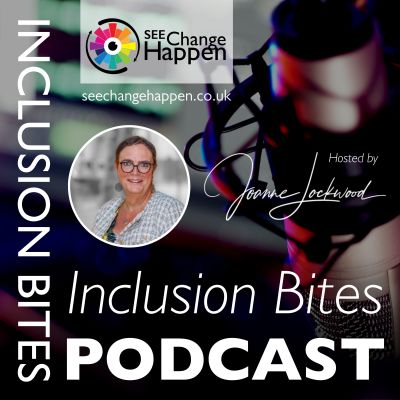Welcome to Inclusion Bites, where your host, Joanne Lockwood, dares to delve deep into the transformative world of Inclusive Cultures and Nurturing Belonging. Uncover the untold stories, challenges, and triumphs as Joanne engages with a dynamic roster of changemakers. Whether you're an HR aficionado, a Diversity & Inclusion champion, or someone who craves meaningful conversations that disrupt the status quo, this is the podcast for you. No room for surface-level chatter—strap in for conversations that not only inspire but also equip you with actionable insights. This isn't just another diversity podcast; this is a call to action. Unplug from the noise, tune into Inclusion Bites, and prepare to be enlightened, one bold conversation at a time. #InclusionBites ????✨
https://seechangehappen.co.uk/inclusion-bites-listen
episode 56: Busting the myths of inter-generational stereotypes
Busting the myths of inter-generational stereotypes
Henry works with generations in the workforce to help them become more productive and effective. She gives us an overview of the generations, busts some myths and provides us with some hacks for getting the best out of every generation in the workforce.
Stereotyping occurs across all generations, and all involve myths, such as someone being ‘being past your sell by date’, or younger people ‘having no experience’. The challenge with myths is that we all have them and need to work to quell them and instead learn more about each other and accept and celebrate differences and variations.
Published: 13.01.2022 Recorded: 06.01.2022 Duration: 1:08:25 Downloads: 114 Shownotes:Henry is an intergenerational specialist and although she does not like the use of labels, when working with organisations she uses them as parameters to discuss how the world has changed. As part of this she explains there are periodic factors and cohort factors that influence generations differently. She explains a periodic factor is a big world event, such as COVID, that impacts everyone but in different ways, depending on age. As we age, we become more experienced emotionally intelligent and are affected by events in different ways then we would have been in earlier life. The cohort factor impacts generations or part of a generation and could be something that other generations may not even be aware of, or have very little interest in, i.e. gaming or snapchat. By breaking things down in this way, it helps Henry and the organisations she works with look at specific areas where they may be challenges within the workforce. (influencers)
In our ever-advancing world it is very easy to become addicted to social media and Henry explains that this may be down to the relationships and community they create. Older generations tend to have two key communities, friends/family and the workplace. For younger people their second community is their social media feed, so they don’t build the same community that maybe older generations would have done at their age. They therefore do not have the same connection or loyalty within their role. The younger generations tend to make decisions based on money and Henry says this is not a great surprise, especially considering that it was people aged between 16-24 that made up the highest category of furloughed or lost jobs during COVID. Organisations need to be aware they are financially led and will make a career move based on this, but Henry says this should be seen as an opportunity for talent acquisition, seeing it as a chance to perhaps win their talent back at a later stage. Older generations often judge this ‘jumping ship’ mentality negatively, rather than understanding the reasoning behind it. It costs 5 to 7xs more to find someone new rather than retain current talent, but we know jobs are no longer for life, so Henry works with organisations to maximise how long each employee will stay in a role, which will save them money. She says organisations need to be aware of how the world has changed and become proactive, viewing retention as their responsibility.
Since COVID there are two tiers of workers, those that need to go into work to do their work and the other are hybrid and remote working. Whist globally the majority of the workforce do still attend a formal work setting, there is conflict over whether younger generations want to return to the office at all and whether working from home negatively impacts their career trajectory and mental health. With language changing so quickly and new words constantly being introduced, Henry says the younger generation still need to the chance to communicate and express themselves in a face-to-face setting effectively.
Henry is passionate about ageism at both ends of the spectrum. Organisations still see older generations as being ‘past it’, or having less to offer, rather than seeing the experience that would be lost if they leave/retire and younger generations, who are viewed as having less to offer, tend to be the first ones to be let go during any troubling times. She wants everyone to be viewed as individuals and calls for us to view work as a family, which will ebb and flow but where everyone is appreciated for who they are, not judged on age etc. Without this we run the risk of it being transactional.
Please connect with our hosts and guests, why not make contact..?Brought to you by your host Joanne Lockwood
SEE Change Happen
A huge thank you to our wonderful guest Henry Rose Lee
intergeneralexpert.com
The post Busting the myths of inter-generational stereotypes appeared first on SEE Change Happen: The Inclusive Culture Experts.
